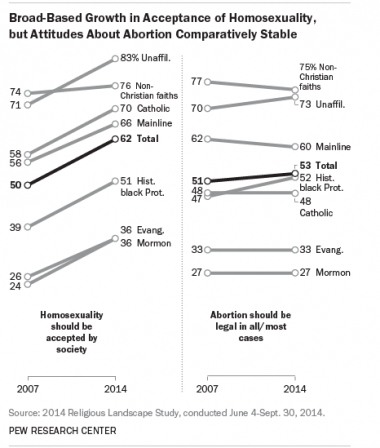Fewer Americans now 'certain' that God exists
The number of Americans who are "asolutely certain" God exists has dropped sharply in under a decade, from seven in ten to just over six in ten, a new study has found.
Overall, the American public is becoming slightly less religious but those with a strong faith remain as devout as ever. Religious and non-religious Americans are all becoming more accepting of homosexuality.
Compared to other Western countries a high proportion of Americans still believe in God, despite a small decline from 92 per cent in 2007 to 89 per cent last year.
The proportion that is "absolutely certain" God exists fell more sharply from 71 per cent to 63 per cent. Numbers who pray every day, attend religious services regularly and consider religion to be very important in their lives have also fallen by small but significant margins.
Those with no religious affiliation, known as "nones", now account for 23 per cent of the adult population, up from 16 per cent in 2007.
The survey of more than 35,000 US adults by Pew Research found that among those who do claim a religion, about three-quarters of all Americans, there has been no discernible drop in most measures of religious commitment. In fact, many are even more devout.

Researcher Gregory Smith said: "Is America becoming less religious? It depends on where you look. If you're looking at the public as a whole, then the answer is yes – we find small but statistically significant declines, overall, in belief in God and several other conventional measures of religious commitment. But if you focus just on people who say they belong to a religion – and that's the vast majority of Americans – they are, on balance, every bit as religious as they were in the recent past."
Not all "nones" are non-believers. In fact, the majority of Americans without a religious affiliation say they believe in God.
But they are not observant.
Alan Cooperman, director of religion research at Pew Research, said: "The 'nones' not only are growing in number, but also distancing themselves even further from traditional, institutional religion. Their growth as a share of the population, coupled with a decline in their self-reported levels of religious observance, is a key factor behind the modest overall drop in the nation's rates of religious belief and practice."
The study found that the growth of the "nones" is having a particularly pronounced impact on the Democratic Party coalition. This group is now more numerous among Democrats and Democratic-leaning adults than Catholics, evangelical Protestants, mainline Protestants or members of the historically black Protestant tradition. Among Republicans they remain far outnumbered by evangelicals, Catholics and mainline Protestants.











